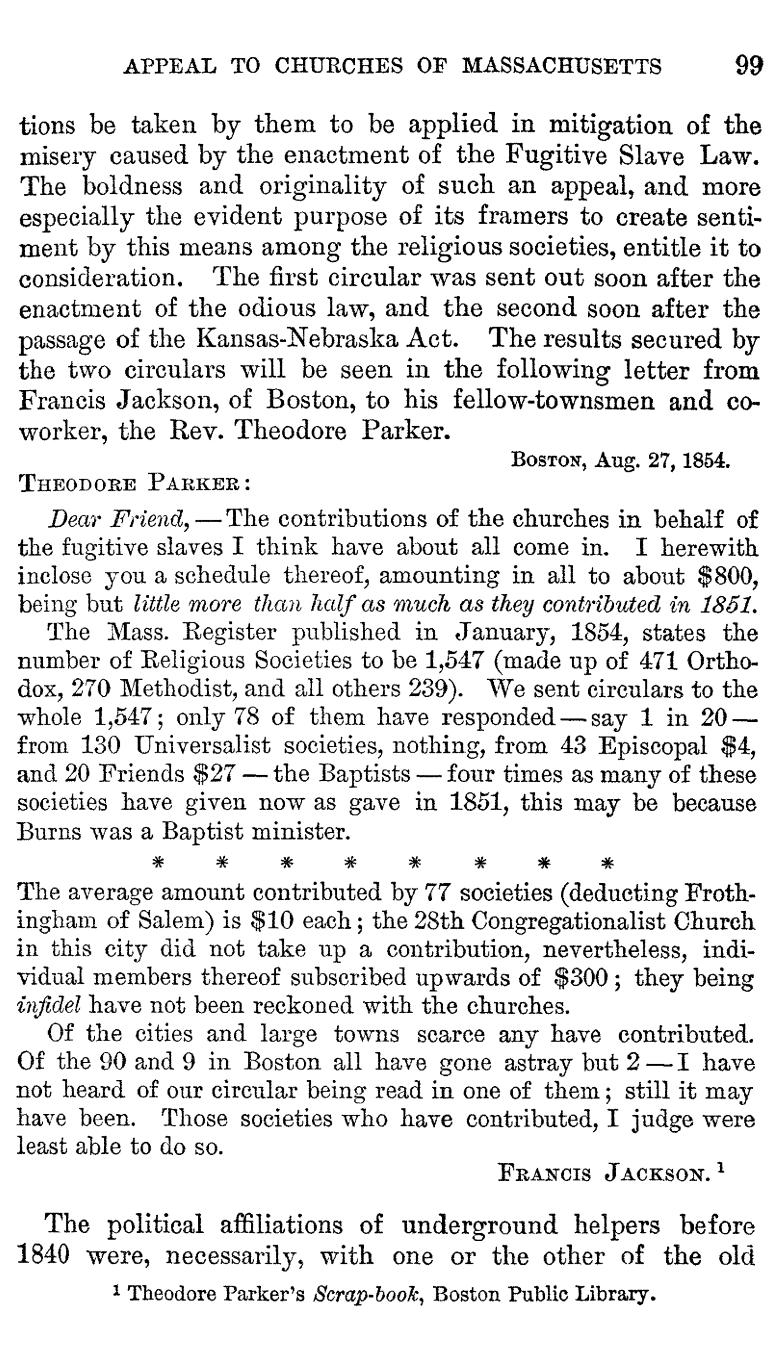
<pb n="99"/> tions be taken by them to be applied in mitigation of the <lb/> misery caused by the enactment of the Fugitive Slave Law. <lb/> The boldness and originality of such an appeal, and more <lb/> especially the evident purpose of its framers to create senti- <lb/> ment by this means among the religious societies, entitle it to <lb/> consideration. The first circular was sent out soon after the <lb/> enactment of the odious law, and the second soon after the <lb/> passage of the Kansas-Nebraska Act. The results secured by <lb/> the two circulars will be seen in the following letter from <lb/> Francis Jackson, of Boston, to his fellow-townsmen and co- <lb/> worker, the Rev. Theodore Parker.</p> <quotedLetter> <opener> <dateline> <name type="place"><smcap>Boston</smcap></name>, <date value="1854-08-27">Aug. 27,1854</date>. </dateline> <salute><smcap>Theodore Parker</smcap>:</salute> </opener> <p><i>Dear Friend</i>,— The contributions of the churches in behalf of <lb/> the fugitive slaves I think have about all come in. I herewith <lb/> inclose you a schedule thereof, amounting in all to about $800, <lb/> being but <i>little more than half as much as they contributed in 1851</i>.</p> <p>The Mass. Register published in January, 1854, states the <lb/> number of Religious Societies to be 1,547 (made up of 471 Ortho- <lb/> dox, 270 Methodist, and all others 239). We sent circulars to the <lb/> whole 1,547; only 78 of them have responded— say 1 in 20— <lb/> from 130 Universalist societies, nothing, from 43 Episcopal $4, <lb/> and 20 Friends $27— the Baptists— four times as many of these <lb/> societies have given now as gave in 1851, this may be because <lb/> Burns was a Baptist minister.</p> <ornament type="characters">*  *  *  *  *  *  * *</ornament> <p>The average amount contributed by 77 societies (deducting Froth- <lb/> ingham of Salem) is $10 each; the 28th Congregationalist Church <lb/> in this city did not take up a contribution, nevertheless, indi- <lb/> vidual members thereof subscribed upwards of $300; they being <lb/> <i>infidel</i> have not been reckoned with the churches.</p> <p>Of the cities and large towns scarce any have contributed. <lb/> Of the 90 and 9 in Boston all have gone astray but 2— I have <lb/> not heard of our circular being read in one of them; still it may <lb/> have been. Those societies who have contributed, I judge were <lb/> least able to do so.</p> <closer> <signed><smcap>Francis Jackson</smcap>.<ref target="n4.1"><sup>1</sup></ref> <note id="n4.1" place="foot"><ns><sup>1</sup></ns><p>Theodore Parker's <i>Scrap-book</i>, Boston Public Library.</p></note> </signed> </closer> </quotedLetter> <p>The political affiliations of underground helpers before <lb/> 1840 were, necessarily, with one or the other of the old <lb/>